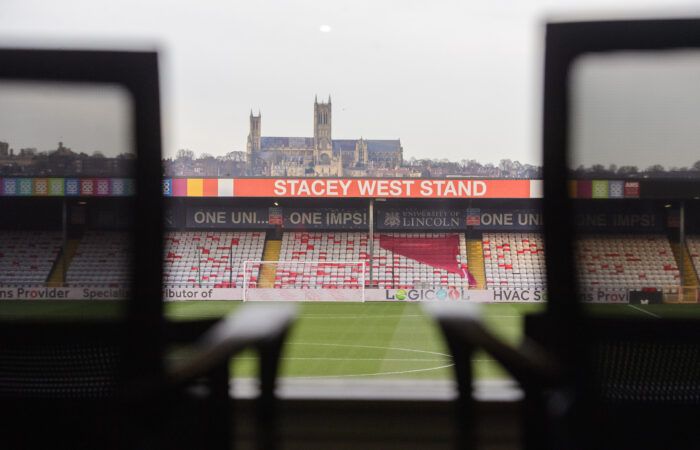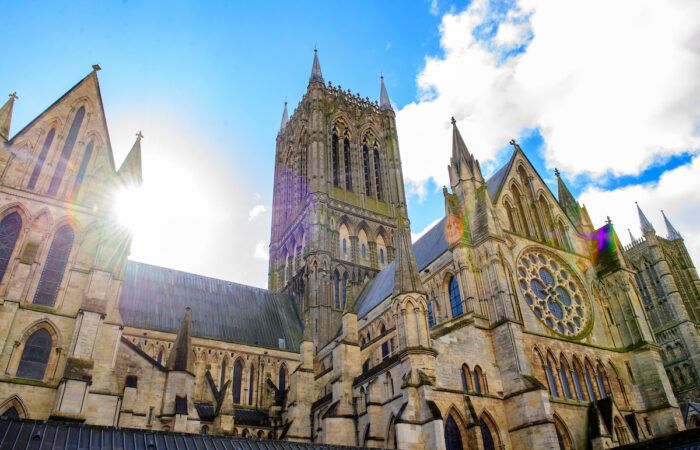Sermon by the Very Reverend Christine Wilson, Dean of Lincoln
Luke 4: 14-21
A couple of weeks ago I watched the film: I Daniel Blake. It was shown on BBC2 at the beginning of January. I found it one of the most harrowing and tragic films I have watched in a long time. At moments it was quite unbearable. Heart rending.
I watched it late one evening on catch up and the very next morning, when I was getting my dose of twitter news, there it was again, an article popped up about a man who had died of cancer, destitute and frustrated, waiting to be fast tracked for incapacity benefit. The cheque arrived the day after he died. Tagged to the news article was another, looking back to just days before Christmas when a man who was terminally ill killed himself, after being declared “fit for work”. His diminishment was un-sufferable.
Well clearly I was not going to be allowed to park the challenge that had confronted me the night before and simply move on. It was a bit of a Good Samaritan moment. Was I going to keep walking or was I going to respond and if so how?
I Daniel Blake, tracks the frustration of what comes across as an impossible-to-achieve task, of claiming and receiving benefits, if you are computer illiterate of physically unfit for work.
Fairly or otherwise, it conveys the hopelessness of trying to be heard and treated with worth and respect, in a system viewed by the writer as more interested in national insurance numbers, and the proof of trying to find work, rather than personal names and human stories.
Well I have accompanied someone to a job centre on a number of occasions and I can testify that they can be deeply depressing and demeaning places.
I have also witnessed people playing the system and rehearsing a convincing story.
Human nature programmes us to survival and self-protection. It is not entirely surprising that some staff grow rather thick-skinned or cynical in the face of the daily onslaught in a jobcentre.
It would be a more comfortable option to dismiss the film as political propaganda or dramatic licence, but the problem is that too many real stories have emerged and been reported as a result of this film for us to dismiss it out of hand. The reason it got under my skin is because there was this nagging feeling that the uncomfortable truth was being told.
There is a moment in the film when the young mother, who hasn’t had a proper meal for days, rips open a can of baked beans at the food bank and then breaks down in tears, shocked at what it has come to and is embarrassed.
This is a story about human dignity.
Later, Katie is caught shoplifting and eventually she resorts to prostitution to feed her two hungry children and keep them warm.
Perhaps the grimmest content of this storyline is the way dignity is chipped away and self-esteem crushed.
The film gives no happy ending, Daniel Blake dies of a heart attack, moments before his appeal meeting. But his refusal to allow evil to triumph comes in his valedictory message read by Katie at his funeral.
“I am not a client, a customer, nor a service user. I am not a shirker, a scrounger, a beggar nor a thief. I am not a national insurance number, nor a blip on a screen…. I demand the right to respect and human dignity.”
When Jesus stands up in the synagogue and announces the Kingdom Manifesto, he doesn’t declare it as an idea or a philosophy, he says today this scripture has been fulfilled in your hearing.
I am bringing in a new reality, announcing Good News to the poor, proclaiming release to captives, liberty to the oppressed.
– Good News for all people, but especially to the poor and down trodden.
The Word made flesh, the revelation of God’s love amongst us, doesn’t just talk about Good News or celebrate the idea of Good News, he is the Good News. When he stands in the synagogue and announces that the prophecy from Isaiah has been fulfilled in their hearing, he declares that human wellbeing matters: Poverty, ill health, the burdens that crush us, are all of great concern to God.
Christ proclaims the enactment of justice, through being with us and for us:
Announcing the right to human flourishing,
to worth and dignity,
to all people being treated with equal concern
to freedom from oppression:
an end powerlessness and exploitation.
You may recall a couple of weeks back, our Curate, Rachel, reminded us that the first relationship we have with God is as the beloved. That even before we are called we are loved. It is from the place of knowing ourselves loved, as people given dignity and worth, made in God’s image, created to live life and live it abundantly, that we can respond to God’s call. From that place we can begin to flourish and fulfil God’s purposes: to love as he first loves us.
Daniel Blake doesn’t rage against his misfortune in becoming ill and finding himself without any income. What angers him is the robbing of his dignity and self-esteem. He demands the right to be named and known to be given respect and human dignity.
The young mother Katie breaks down and cries because of the humiliation of her predicament. Her despair is at her out of character actions caused by hunger and inability to provide for her children.
Her dignity is gone and with it any shred of well-being and esteem. She is broken and yet … love still prevails. She reads the message at the funeral and loves her children fiercely.
The Good News we embrace in our study of the ministry of Jesus is how he came to be alongside and with the poor, standing with the oppressed and drawing near to the outcast. Essentially the announcement of Good News in the gift of the incarnation is not so much about doing for, but being with us.
I said earlier that the film led me to a metaphorical Good Samaritan moment. Was I going to keep walking or was I going to respond and do something? What difference will it make?
The insight in exploring that question is that it is not so much our solution based activity that is needed but more essentially our capacity to be with the poor, listening to the voices of men and women who are marginalised or oppressed. Listening to stories about real human lives, raising up their voices, and giving respect and dignity.
Sam Wells in his book” living without enemies” advocates this message of being with and being for, orientating our lives towards concern for the well-being of others and most importantly naming not objectifying people. Which means watching our language and our tendency to describe people as a collective group of others: the homeless, the poor, the needy, the mentally ill…and so on.
Daniel Blake demanded his human right to be named and known.
Of course we can’t know every story and I don’t suppose we could bear it! But shifting our focus from doing unto, to being with, is something we can pray for and hope to enact. It is deeply incarnational and hospitable.
As the Body of Christ, how can we be a mirror of the incarnation? Proclaimers of hope and bearers of Good News? Where can we stand with Christ as he draws near with a heart full of love, passionate for justice and melting with mercy?
If you haven’t seen “I Daniel Blake” I recommend it.

